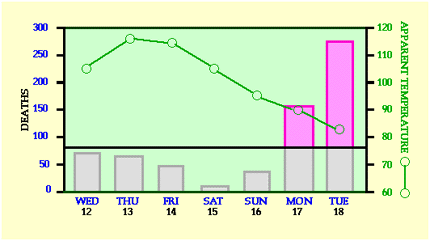| Chicago: Record Hot Air, Record Low Death Rate. |

|
| Chicago: Record Hot Air, Record Low Death Rate. |

|
The July 12-18, 1995 newspapers you no doubt read and the NPR reports that fancied your ears probably had the following news-hook -- Chicago: Record Hot Air, Record High Death Rate. So who is on the high-traction slope of truth? My good University of Virginia colleague, climatologist Robert Davis, has looked at the data and he says the death rate for the week of the heat wave was not remarkable.
If we look at the banner-graph above we can see that the two days before the news media-Kavorkians brightened our TV-phosphors, the Chicago death rate was 14 on July 15th and 36 on Sunday the 16th. The previous record low for Chicago was 46. 78 die per day on the average. On the 17th and 18th, the death rates soared such that the two days taken together had 276 "excess" deaths, i.e. above the average for the days. On an average US year there are 240 "excess" deaths in the entire country.
So I was right and the media was right and the data were bad. In discussing the heat-wave and heat-deaths last August when the data started to arrive on the climatologists desks, my friend Bob referred to the Saturday and Sunday's "deficit" of deaths as due to unfetched bodies. A grim vision in opposition to the traffic jams of ambulances on Monday and Tuesday that followed and rang the alarm bells of the worry.
Someone did ask. Was the heat wave and the excess deaths yet another mark of global warming? Climatology professor Larry Kalkstein, one of our national experts on climate and human health, delivered the following: "There is no evidence that this has anything to do with global warming." To Larry's great credit, he called this shot before missing-weekend-bodies problem was cleared up. It was a hot one but not out of the league of the 1980, 1983 or 1988 summer heat-waves in Chicago.
Watch your journals in about 10 months for Bob's paper on the Great Chicago Heat Wave of 95. This CED teaser is just to wet your appetite for the full story.